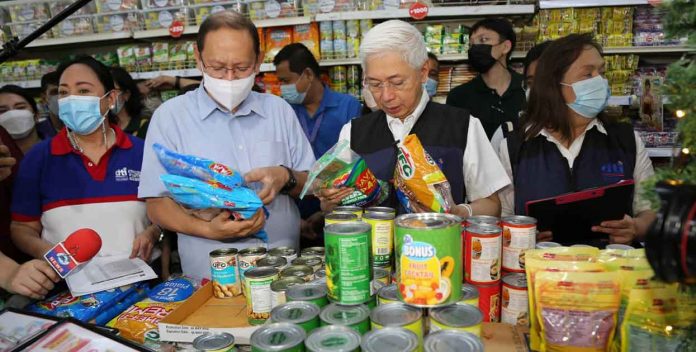
ILOILO City – The Department of Trade and Industry (DTI) has released a price guide for noche buena products showing an increase in the prices of at least 12 items.
Items included in the price guide are the commonly bought noche buena products such as ham, fruit cocktail, queso de bola, pasta, spaghetti sauce, tomato sauce, and all-purpose cream.
The price guide, however, is not a suggested retail price (SRP), thus it cannot be imposed on business establishments, clarified Felisa Judith L. Degala, DTI-6 OIC-assistant regional director.

The price guide is an information or reference for consumers and retailers about the prices of items.
“Kon may pag-take advantage on the part sang business establishments, ginpasobrahan ‘ya gid iya presyo, ti ara na na sa Consumer Act of the Philippines,” said Degala.
Noche buena products are seasonal, thus they are not categorized as basic necessities and prime commodities under Republic Act (RA) No. 7581 or Price Act, as amended by RA No. 10623.
Degala advised the buying public to live within their budget.
“Let us celebrate (Christmas) because that is a tradition of every Filipino. Bisan simple lang, naga-celebrate sa aton lang masarangan,” said Degala.
When buying the noche buena items check the expiry date and the price tag and compare with other similar products, she added.
“Buy as early as you can kon may budget man lang para you can exercise your right to choose kag para indi matam-an expose kon may ara pa gid man COVID,” Degala added.
The DTI-6 OIC-assistant regional director also urged consumers to patronize local products as a way of supporting local micro, small and medium enterprises (MSMEs).
“Kon may ara man lang da sa palibot ninyo, may gabaligya man lang da sang parehas man lang sa supermarket, let us patronize local products of our local MSMEs para makabulig kita sa aton ekonomiya,” Degala said.
Based on the price guide for noche buena items, 195 out of 223 stock keeping units (SKUs) or product variants have increased prices, ranging from one to five percent, six to 10 percent, and over 10 percent.
Of the 195 SKUs that posted an increase, 94 items increased by more than 10 percent, 51 increased by six to 10 percent and 50 saw price increase by one to five percent.
Degala noted that 18 of the 223 SKUs are new product variants.
The DTI-6 OIC-assistant regional director added that two ham variants posted price reductions while the prices of eight product items (four SKUs of ham, two of mayonnaise, two of sandwich spread) were unchanged.
Prices of 13 ham product variants went up by one to five percent, seven had a price increase of six to 10 percent, and three have increased by more than 10 percent.
Most spaghetti, elbow macaroni, salad macaroni, and spaghetti sauce products have also gone up by more than 10 percent.
For fruit cocktail, two of its variants had one to five percent price increase, eight have six to 10 percent increase, and one posted more than 10 percent increase.
For queso de bola, two SKUs had an increase of one to five percent, six had six to 10 percent increase, and four had more than 10 percent upward adjustment.
Two product variants of cheese had a one to five percent increase, seven had a six to 10 percent increase, and four had more than 10 percent increase.
As to the tomato sauce, four of its SKUs had an increase of six to 10 percent in prices and nine others went up by more than 10 percent.
Based on the price guide, which took effect yesterday, ham prices now range from P163 to P892.50 compared to last year’s pricing that ranged from P158 to P862.50.
Other items’ prices such as queso de bola ranges from P199.50 to P513.75; fruit cocktails from P56 to P288; cheese from P54.35 to P371; spaghetti sauce from P23.55 to P95.50; tomato sauce from P17.25 to P92.25; mayonnaise from P24 toP234; sandwich spread from P26 to P252; elbow macaroni from P23 to P119; and salad macaroni from P39 to P117.
According to Degala, manufacturers attributed the price hikes mostly to the rising cost of raw and packaging materials.
For instance, for ham, some of the raw and packaging materials are imported while pork’s cost increased by 18 percent compared to 2021.
The raw materials of fruit cocktail such as fruits and sugar were also factored in.
Degala noted that the increase was also influenced by the weakening of the peso against the dollar, considering that some of the raw and packaging materials are imported./PN



